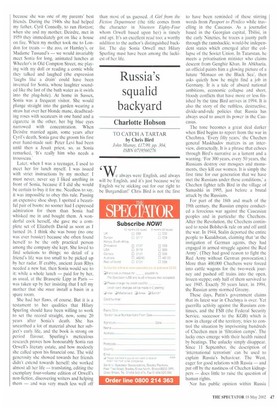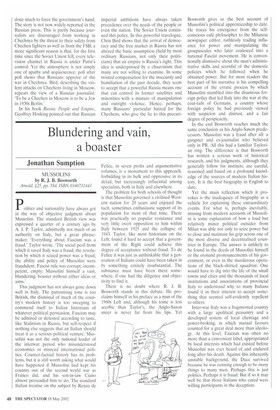Russia's squalid backyard
Charlotte Hobson
TO CATCH A TARTAR by Chris Bird John Murray, £17.99, pp. 304, ISBN 0719560276
e always were English, and always will be English, and it's just because we're English we're sticking out for our right to be Burgundian!' Chris Bird is not the first to have been reminded of these stirring words from Passport to Pimlico while travelling in the Caucasus. As a journalist based in the Georgian capital, Tbilisi, in the early Nineties, he traces a jaunty path through the ramshackle, would-be independent states which emerged after the collapse of the Soviet Union. In Tatarstan, he meets a privatisation minister who claims descent from Genghiz Khan. In Abkhazia, an official paints him a glowing picture of a future 'Monaco on the Black Sea', then asks quietly how he might find a job in Germany. It is a tale of absurd national ambitions, economic collapse and short, bloody conflicts that have more or less finished by the time Bird arrives in 1994. It is also the story of the ruthless, destructive, divide-and-rule policies that Russia has always used to assert its power in the Caucasus.
The tone becomes a great deal darker when Bird begins to report from the war in Chechnya. 'Every fifty years,' the Chechen general Maskhadov mutters in an interview, distractedly. It is a phrase that echoes through Bird's narrative as a lament and a warning. Tor 300 years, every 50 years, the Russians destroy our mosques and monuments, they kill our women. It is simply the first time for our generation that we have met the Russians under these conditions,' a Chechen fighter tells Bird in the village of Samashki in 1995, just before a brutal attack by the Russians.
For part of the 18th and much of the 19th century, the Russian empire conducted a ferocious war against the Caucasian peoples and in particular the Chechens. After the Revolution, the Chechens continued to resist Bolshevik rule on and off until the war. In 1944, Stalin deported the entire people to Kazakhstan, claiming that 'at the instigation of German agents, they had engaged in armed struggle against the Red Army'. (They had good reason to fight the Red Army without German provocation.) More than 400,000 Chechens were forced into cattle wagons for the two-week journey and pushed off trains into the open, frozen steppe; only half of them survived to see 1945. Exactly 50 years later, in 1994, the Russian army stormed Grozny.
These days, Putin's government claims that its latest war in Chechnya is over. Yet guerrilla activity against the Russians continues, and the FSB (the Federal Security Service, successor to the KGB) which is now in charge of the territory, tries to control the situation by imprisoning hundreds of Chechen men in 'filtration camps'. The lucky ones emerge with their health ruined by beatings. The unlucky simply disappear. Since 11 September, the description of 'international terrorism' can be used to explain Russia's behaviour. The West, eager for good relations with Russia — and put off by the nastiness of Chechen kidnappers — does little to raise the question of human rights.
Nor has public opinion within Russia done much to force the government's hand. The story is not now widely reported in the Russian press. This is partly because journalists are discouraged from working in Chechnya by the threat to their safety from Chechen fighters as well as from the FSB; a more significant reason is that, for the first time since the Soviet Union fell, every television channel in Russia is under Putin's control. Yet the atmosphere is not simply one of apathy and acquiescence: poll after poll shows that Russians approve of the war in Chechnya. Bird, describing the violent attacks on Chechens living in Moscow, repeats the view of a Russian journalist: 'To be a Chechen in Moscow is to be a Jew in 1930s Berlin.'
In his book Russia: People and Empire, Geoffrey Hosking pointed out that Russian imperial ambitions have always taken precedence over the needs of the people or even the nation. The Soviet Union continued this policy. In this powerful travelogue, Chris Bird shows that the arrival of democracy and the free market in Russia has not altered the basic assumption (held by most ordinary Russians, not only their politicians) that an empire is Russia's right. This idea is underpinned by a chauvinism that many are not willing to examine. In some twisted compensation for the insecurity and humiliation of the past decade, they seem to accept that a powerful Russia means one that can control its former satellites and minorities with a mixture of manipulation and outright violence. Hence, perhaps, many Russians' particular hatred for the Chechens, who give the lie to this precari















































































 Previous page
Previous page